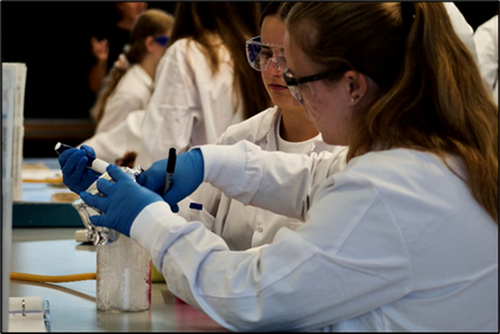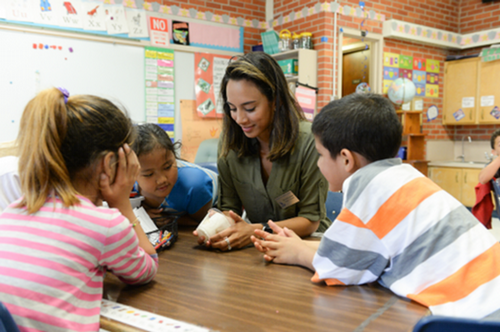ExpLearn: Undergraduate Research
Examples of Undergraduate Research
-
General Biology I - Phage Research Lab
 In Fall 2023, the Hicks Honors College offered for the first time a unique introductory Biology course designed to engage first-year students in authentic research. Students who enrolled in Honors General Biology I entered the course as novice researchers and quickly learned a suite of skills and techniques from across the discipline needed to isolate a novel virus.
In Fall 2023, the Hicks Honors College offered for the first time a unique introductory Biology course designed to engage first-year students in authentic research. Students who enrolled in Honors General Biology I entered the course as novice researchers and quickly learned a suite of skills and techniques from across the discipline needed to isolate a novel virus.The students successfully isolated a new phage infecting the bacteria host, Gordonia, which they named Petito (https://phagesdb.org/phages/Petito/).
The first-year research team is continuing their research work this spring in an interdisciplinary writing course that blends bioinformatics and science writing. Students will present their research findings at several local and national conferences and intend to publish their findings as a Microbial Resource Announcement with an accompanying full-genome annotation of Petito in GenBank. The Howard Hughes Medical Institute Science Education Alliance supports this unique series of course offerings.
-
Benefits and Challenges of Support Facilitation in an Inclusive Classroom
 Lily Miller, an Exceptional Student Education major, and Sydney Williams, a Special Education major with a minor in Disability Services, worked as a team with Dr. David Hoppey, in the Department of Teaching, Learning and Curriculum, to perform an assessment of their teaching internship experience at a middle school in Duval County. The results of their inquiry were presented at the Florida Council for Exceptional Children Conference and published in PANDION: The Osprey Journal of Research and Ideas, Vol. 3. Both Lily and Sydney found that their experience strengthened their skills in data recording and analyses and allowed them to think critically about teaching. According to their faculty mentor, the study was well received by special education faculty and administrators from across the state, and both students have been recruited by multiple school districts because of their work.
Lily Miller, an Exceptional Student Education major, and Sydney Williams, a Special Education major with a minor in Disability Services, worked as a team with Dr. David Hoppey, in the Department of Teaching, Learning and Curriculum, to perform an assessment of their teaching internship experience at a middle school in Duval County. The results of their inquiry were presented at the Florida Council for Exceptional Children Conference and published in PANDION: The Osprey Journal of Research and Ideas, Vol. 3. Both Lily and Sydney found that their experience strengthened their skills in data recording and analyses and allowed them to think critically about teaching. According to their faculty mentor, the study was well received by special education faculty and administrators from across the state, and both students have been recruited by multiple school districts because of their work. -
Can Bacteria Help Prevent Beach Erosion?
 Amar Kosovac, a UNF Biology major, worked with Dr. Terri Ellis in the Department of Biology and Dr. Raphael Crowley in the School of Engineering on a collaborative project aimed at preserving Florida’s Atlantic Coast. Amar received funding from the Office of Undergraduate Research to investigate the effect of different calcium salts on enzyme activity using microbial-induced carbonate precipitation (MICP), which can then be sprayed on beach sand. Amar presented the results of his study at an on-campus symposium and the Florida Undergraduate Research Association Posters at the Capitol event in Tallahassee. He will continue working on this project as a Master of Science in Biology student at UNF and plans to pursue a career in applied microbial research.
Amar Kosovac, a UNF Biology major, worked with Dr. Terri Ellis in the Department of Biology and Dr. Raphael Crowley in the School of Engineering on a collaborative project aimed at preserving Florida’s Atlantic Coast. Amar received funding from the Office of Undergraduate Research to investigate the effect of different calcium salts on enzyme activity using microbial-induced carbonate precipitation (MICP), which can then be sprayed on beach sand. Amar presented the results of his study at an on-campus symposium and the Florida Undergraduate Research Association Posters at the Capitol event in Tallahassee. He will continue working on this project as a Master of Science in Biology student at UNF and plans to pursue a career in applied microbial research. -
Raising (S)hell: Investigating the Cedar Point North Shellworks
Vic and Dr. Ashley jointly presented the results of this study at the Southeastern Archaeological Conference and the Timucuan Science and History Symposium. Vic indicated that she enjoyed participating in all aspects of the archaeological project, from research design to fieldwork and analysis, and finally, to reporting the findings. Through these experiences, she enhanced her knowledge base, as well as her written communication skills. Next, Vic is now working on an undergraduate honors thesis, in which she will analyze ceramic variability and site activities using pottery collected within the Mill Cove Complex archaeological site. After graduation, Vic plans to attend graduate school to pursue a Ph.D. and a career in academic archaeology. Vic Hayes, an anthropology major working with Dr. Keith Ashley in the Department of Sociology, Anthropology, and Social Work, served as a field assistant for the Archaeological Field Methods class, for which she received a Transformational Learning Opportunity Summer Scholarship from the College of Arts and Sciences. During that time, she also received a Timucuan Preserve Student Research Grant, which allowed her to topographically map and then excavate two mounded shell formations at the Cedar Point North archaeological site. She also performed an in-depth analysis of all pottery unearthed.
Vic Hayes, an anthropology major working with Dr. Keith Ashley in the Department of Sociology, Anthropology, and Social Work, served as a field assistant for the Archaeological Field Methods class, for which she received a Transformational Learning Opportunity Summer Scholarship from the College of Arts and Sciences. During that time, she also received a Timucuan Preserve Student Research Grant, which allowed her to topographically map and then excavate two mounded shell formations at the Cedar Point North archaeological site. She also performed an in-depth analysis of all pottery unearthed.
